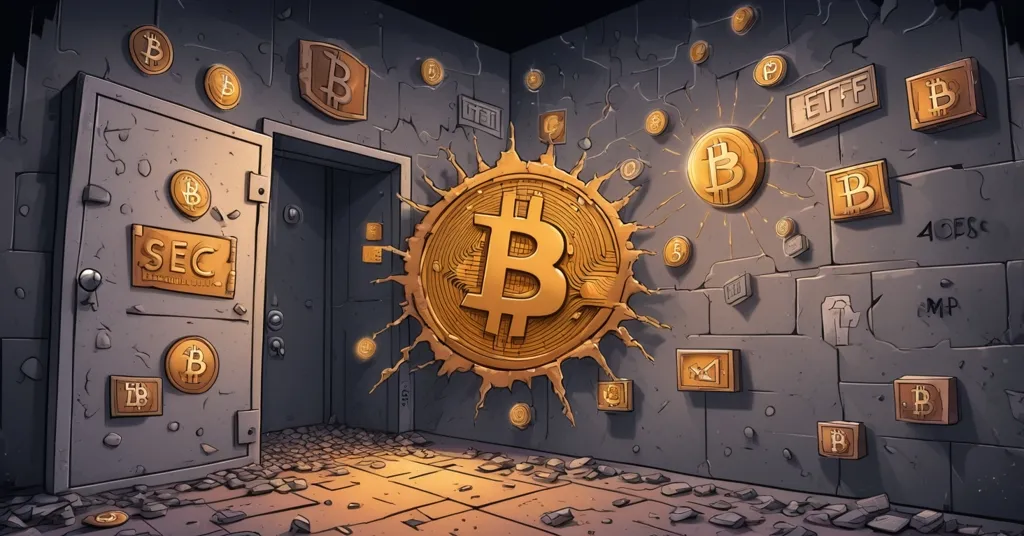SEC Delays Trump Media’s Truth Social Bitcoin ETF Decision to September 2025

Trump Media’s Bitcoin ETF Hits Regulatory Wall: SEC Delays Decision to September 2025
The U.S. Securities and Exchange Commission (SEC) has slammed the brakes on Trump Media’s Truth Social Bitcoin ETF, pushing its decision date to September 18, 2025, from an earlier expected timeline in July. This delay isn’t just a bureaucratic hiccup—it’s a glaring sign of the SEC’s tightrope walk between fostering crypto innovation and guarding against risks, especially when the product is tied to the polarizing figure of Donald Trump.
- SEC Postponement: Decision on Truth Social Bitcoin ETF delayed until September 18, 2025, for deeper scrutiny.
- Political Twist: ETF’s link to Trump’s Truth Social platform adds unique regulatory and ethical concerns.
- Wider Impact: Move reflects broader SEC caution on altcoin and politically branded crypto funds.
The SEC’s Delay: A Closer Look at the Hold-Up
Trump Media and Technology Group filed for the Truth Social Bitcoin ETF in June, aiming to join the digital asset investment wave with a listing on NYSE Arca. This came after a banner year for crypto, with the SEC approving 12 spot Bitcoin ETFs since January 2024, which have collectively pulled in over $54.8 billion in inflows—making them one of the most successful ETF launches in U.S. history, with heavyweights like BlackRock’s IBIT leading the charge. Ethereum ETFs also got the nod earlier this year, solidifying crypto’s foothold in traditional finance. So why the cold shoulder for Truth Social’s fund? For more on this specific delay, check out the latest updates on the Truth Social Bitcoin ETF SEC decision timeline.
The Commission finds it appropriate to designate a longer period within which to take action on the proposed rule change so that it has sufficient time to consider the proposed rule change and the issues raised therein.
In plain English, the SEC is buying time to navigate a potential minefield. Legally, they have up to 240-270 days to finalize their ruling, a window that allows for public comments, internal debates, and meticulous checks on market stability, investor protection, custody setups, and risks of manipulation. For the uninitiated, a Bitcoin ETF is like a middleman—it lets investors ride Bitcoin’s price waves without owning the actual cryptocurrency. Spot ETFs, unlike futures-based ones, hold real Bitcoin, giving direct exposure to its value. Historically, the SEC dragged its feet for over a decade before greenlighting the first spot Bitcoin ETF in 2024, haunted by fears of fraud and volatility. This latest delay feels like déjà vu, but with an extra layer of political baggage. Curious about past SEC hesitations? Explore community insights on why the SEC delays Bitcoin ETF approvals.
Political Hot Potato: The Trump Branding Problem
The Truth Social Bitcoin ETF isn’t just another crypto product—it’s a lightning rod due to its ties to Donald Trump’s social media platform. If approved, it would mark the first crypto ETF linked directly to a sitting U.S. president’s business interests, a precedent that’s got regulators and critics sweating. Mixing personal business with public influence raises the specter of unfair sway over investor trust, not to mention potential conflicts of interest. Democratic lawmakers like Senators Elizabeth Warren and Jeff Merkley, alongside Representative Maxine Waters, have sounded alarms over Trump’s broader crypto entanglements, calling them an “unprecedented ethical dilemma.” For a deeper dive into the political ramifications, see this analysis of the political implications of Truth Social’s ETF.
Adding fuel to the fire is the Trump family’s involvement in World Liberty Financial, a decentralized finance (DeFi) project. On July 16, 2025, holders of its $WLFI tokens voted with 99.94% support to make them tradable, a move that screams speculative hype tied to the Trump brand. Reports peg the family’s earnings from this venture at around $500 million, with significant stakes in the tokens themselves. For more details on this venture, read about Trump’s evolving crypto stance and World Liberty Financial. As Chris Swartz, a former U.S. Office of Government Ethics attorney, put it bluntly:
This is a clear conflict of interest and potentially a conduit for foreign influence.
Such numbers and statements aren’t just eyebrow-raising—they’re a direct challenge to the impartiality the SEC is supposed to uphold. DeFi, for those new to the term, stands for decentralized finance, a system of financial applications built on blockchain tech aiming to cut out traditional middlemen like banks. But when 99.94% of token holders vote in lockstep, it smells more like centralized control than the peer-to-peer freedom we champion. This isn’t the decentralized utopia Bitcoin was built for; it’s a circus act the crypto space could do without.
Trump’s Crypto Pivot: From Skeptic to Cheerleader
Donald Trump’s journey with crypto is a 180-degree turn worth unpacking. Once a loud critic who called Bitcoin a “scam,” he’s now a self-proclaimed champion since returning to office in January. He’s pushed for the U.S. to become the global “crypto capital,” signed the GENIUS Act to regulate stablecoins (digital currencies pegged to assets like the dollar for price stability), and even directed federal agencies to recognize crypto in mortgage underwriting. His appointment of Paul Atkins, a known crypto supporter, as SEC Chair seemed like a golden ticket for the industry. Yet, even with a friendly face steering the ship, the SEC isn’t rushing to approve politically charged or speculative funds. Learn more about the potential impact of Paul Atkins’ SEC leadership on crypto policies.
Trump’s newfound zeal aligns with the effective accelerationism (e/acc) we support—tech disrupting the status quo at breakneck speed. But when your family’s banking half a billion from DeFi side hustles, skepticism about motives isn’t just warranted; it’s necessary. If you’re a Bitcoin OG, you’ve seen regulatory drama before, but a president-branded ETF? That’s a whole new beast. Compare this to historical cases where political figures dabbled in finance—markets often jittered at the whiff of favoritism. The SEC might not have a political crystal ball, but they’re damn sure triple-checking every line of this application.
Broad regulatory Trends: Altcoins and the Crypto Bottleneck
The Truth Social ETF delay isn’t an isolated incident—it’s part of a broader SEC pattern of caution. Decisions on other crypto ETFs, like Grayscale’s Solana Trust (pushed to mid-October) and applications for Litecoin, Cardano, and Dogecoin funds from firms like VanEck and Bitwise, are also on hold. SEC Commissioner Hester Peirce, dubbed “Crypto Mom,” recently urged patience, citing internal litigation and complex considerations as reasons for the slow pace. For context, Solana and Cardano are blockchain platforms for decentralized apps (dApps) and smart contracts, rivaling Ethereum, while Dogecoin, born as a meme, fuels speculative mania. Their market structures are less mature than Bitcoin’s—think smaller trading volumes and unproven use cases—making them riskier bets in the SEC’s eyes. For a broader perspective, check out discussions on the SEC delays surrounding Trump Media’s ETF on Reddit.
As Bitcoin maximalists, we see the king of crypto as the safest store of value, the digital gold that underpins this financial revolution. But let’s not kid ourselves—Bitcoin has flaws, from scalability hiccups to energy consumption gripes. Altcoins fill niches Bitcoin doesn’t touch (and maybe shouldn’t), like Ethereum’s smart contracts powering DeFi or Solana’s faster transactions. Still, many come with baggage—volatility that’d make a rollercoaster blush and outright scams. Dogecoin as an ETF? Might as well list a viral tweet as collateral. These delays signal a regulatory bottleneck that could slow altcoin adoption while Bitcoin cements its dominance, for better or worse.
Decentralization at Risk: The Bigger Picture
The stakes with the Truth Social ETF go beyond a single fund. Its outcome could shape how politically affiliated financial products are handled in the U.S., potentially seeping into the ethos of decentralization we hold dear. Bitcoin’s core promise, as envisioned by Satoshi Nakamoto in the 2008 whitepaper, was peer-to-peer money free from institutional overreach. Political branding risks flipping that on its head, concentrating influence in the hands of a few—especially when tied to speculative fervor like $WLFI token holders expecting price jumps to $12 based purely on a name. That’s not innovation; it’s shilling over substance, and we’ve got zero tolerance for that nonsense. To understand the historical context, take a look at crypto policies under Trump’s administration on Wikipedia.
On the flip side, the SEC’s caution isn’t entirely baseless. The crypto space has seen enough rug pulls and pump-and-dumps to fill a horror novel. Politically linked funds could open a Pandora’s box, blending financial tech with partisan loyalty in ways that erode trust. Yet, endless delays clash with our push for e/acc—delaying innovation risks ceding global crypto leadership to places like the EU or Asia, where regulatory frameworks are already racing ahead. A crypto-friendly SEC under Atkins could still drive progress, even if this specific ETF flops. Imagine streamlined approvals for non-branded funds or clearer rules for DeFi—proof that freedom and accountability can coexist. For insights into the specific hurdles, read about the regulatory challenges facing Trump Media’s Bitcoin ETF.
What’s Next for Crypto and Politics?
As we count down to September 2025, the crypto community—whether you’re a wide-eyed newbie or a battle-scarred OG—needs to watch this saga closely. It’s not just about Trump Media scoring an ETF win; it’s about how much political influence will infiltrate decentralized tech and whether regulators can strike a balance between liberty and oversight. Bitcoin remains the purest bet on financial sovereignty, the bedrock of this movement. Altcoins and blockchains like Ethereum and Solana deserve space to innovate, but not every half-baked fund or meme token riding a politician’s coattails gets a free pass. We’re all in for adoption, but not at the cost of integrity. No hype, no bullshit—just the raw truth.
Key Takeaways and Questions on the Truth Social Bitcoin ETF Delay
- What’s the latest update on Trump Media’s Bitcoin ETF?
The SEC has postponed its decision until September 18, 2025, to thoroughly evaluate the proposal and its risks. - Why is the SEC hesitant about this particular Bitcoin ETF?
Beyond typical concerns like market stability and investor safety, the political branding tied to Truth Social raises conflict-of-interest red flags. - How does Trump’s crypto involvement complicate matters?
His family’s reported $500 million stake in World Liberty Financial and pro-crypto policies fuel scrutiny from lawmakers and ethics experts. - What do broader crypto ETF delays mean for the industry?
Delays on Solana, Cardano, and other funds highlight a regulatory logjam, potentially slowing altcoin growth while Bitcoin holds strong. - Does political branding threaten crypto’s decentralization?
Yes—it risks centralizing influence, clashing with the peer-to-peer freedom Bitcoin and blockchain tech stand for. - Can effective accelerationism survive regulatory delays?
Only if the SEC balances caution with innovation; stalling too long could hand global crypto dominance to other regions.



